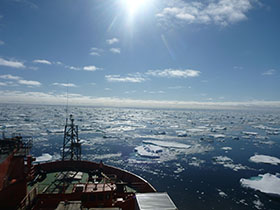Deakin research saves Antarctic fish from wastewater fate
Media releaseThe findings of a Deakin University PhD student investigating the impact of wastewater on fish in Antarctica has contributed to a major new environmental initiative to protect the continent from pollution.
Dr Patricia Corbett's study found existing wastewater treatment at Davis Station was negatively impacting local marine organisms.
The finding was a key aspect of evidence that led to the Australian Antarctic Division's decision to upgrade wastewater treatment facilities at the nation's research stations on the continent.
Dr Corbett said the bottom dwelling Antarctic Rock-cod collected close to the wastewater discharge site were in poorer health than those collected from further away.
"Antarctic Rock-cod are good fish to assess for contamination impact because they can be exposed to contamination directly from the source, through the sediments and their diet," she said.
"Each fish was placed into a classification of mild, moderate or severe alteration after assessment.
"Fish close to the wastewater outfall had a higher incidence and severity of cellular alteration affecting their overall health.
"Impacts of the wastewater were detected up to 4km from the outfall and decreased with distance from the wastewater outfall."
The research provided some of the first evidence of direct impacts on local marine organisms.
Dr Corbett said she was pleased that the new treatment plant was being built as a result of the comprehensive environmental impact assessment led by the Australian Antarctic Division, which her study contributed to.
Wastewater at Davis Station was disposed of by combustion until 1991 when a secondary wastewater treatment facility was implemented.
The facility was decommissioned and infrastructure removed in 2005 due to ongoing mechanical complications. Since then wastewater has been macerated before being discharged to the marine environment.
Construction of the new facility has begun, starting with secondary treatment, with plans to upgrade to an advanced, state-of-the-art, tertiary wastewater treatment system eliminating the risk of environmental impacts to the marine environment in the future.
Dr Corbett hopes to continue researching in Antarctica. Over summer she returned to Casey Station to manage a similar project looking at the impact of its wastewater as well as ecosystem recovery at a legacy waste disposal site that has undergone full removal and remediation.
The fish and shellfish collected will be analysed back in Australia.
"Antarctica is often perceived as pristine, however small areas of localised pollution occur within close proximity to Antarctic stations," said Dr Corbett, who has now been to all three Australian research stations.
"The experience itself is hard to explain to those who have not been," she said.
"The feeling you get when you are travelling down on the ship and start to see ice and then your first iceberg is an experience you will never forget."
"It is fantastic community and you make friends for life. I got to go fishing in Antarctica which is pretty amazing. It's the opportunity of a lifetime."
The PhD was supervised by Deakin University Senior Lecturer in Aquatic Ecotoxicology, School of Life and Environmental Sciences, Dr Julie Mondon and by research scientist Dr Catherine King from the Australian Antarctic Division.
Share this story
 Research sparkles: Aurora Australis on its way to Antactica's Davis Station, where research from Deakin University scientist Dr Patricia Corbett contributed to a new wastewater treatment plan after she found the current conditions were harming rock cod in the area.
Research sparkles: Aurora Australis on its way to Antactica's Davis Station, where research from Deakin University scientist Dr Patricia Corbett contributed to a new wastewater treatment plan after she found the current conditions were harming rock cod in the area.
